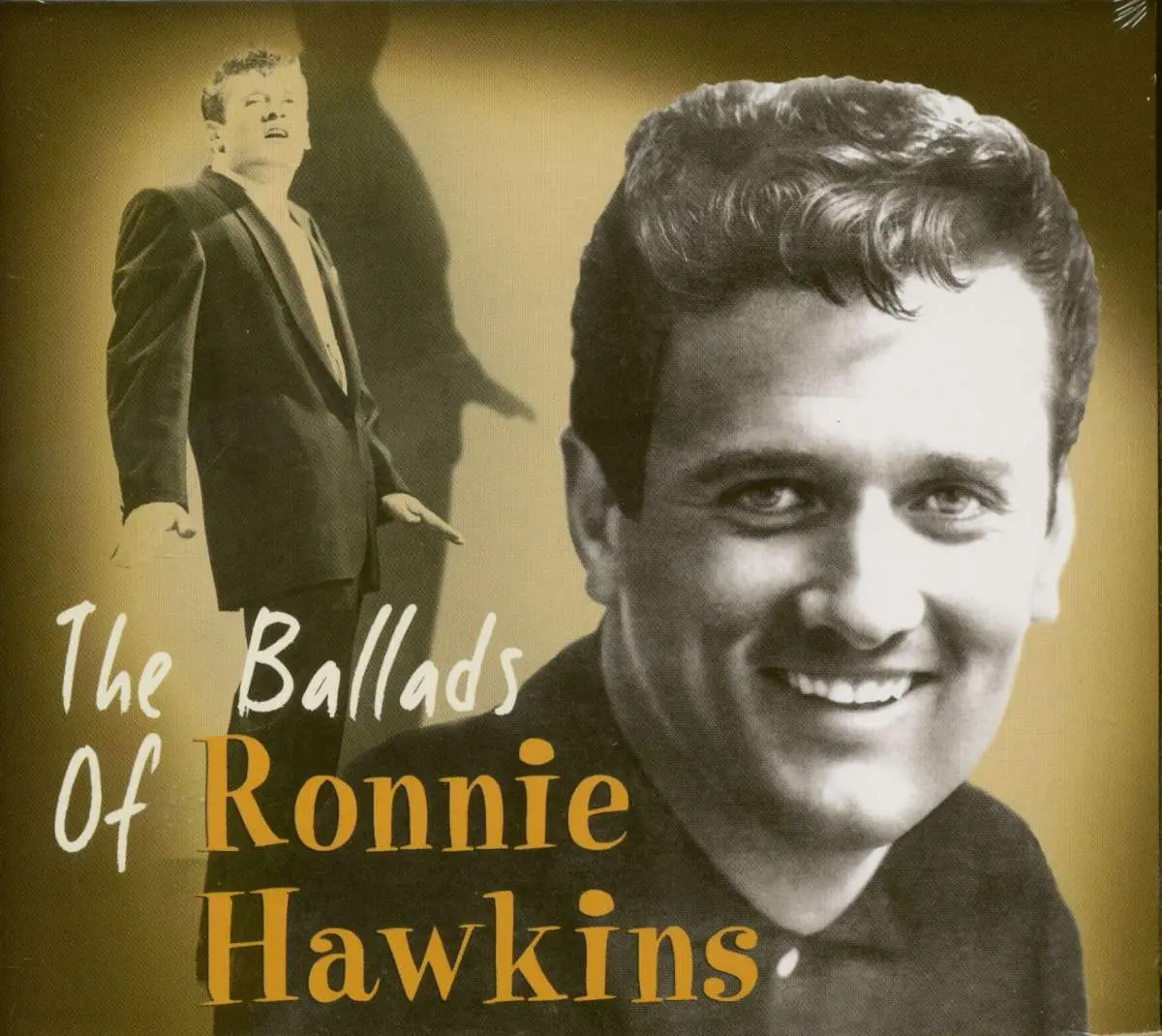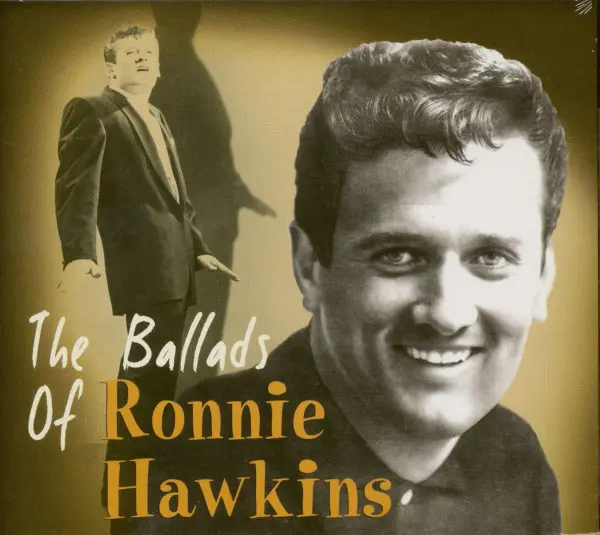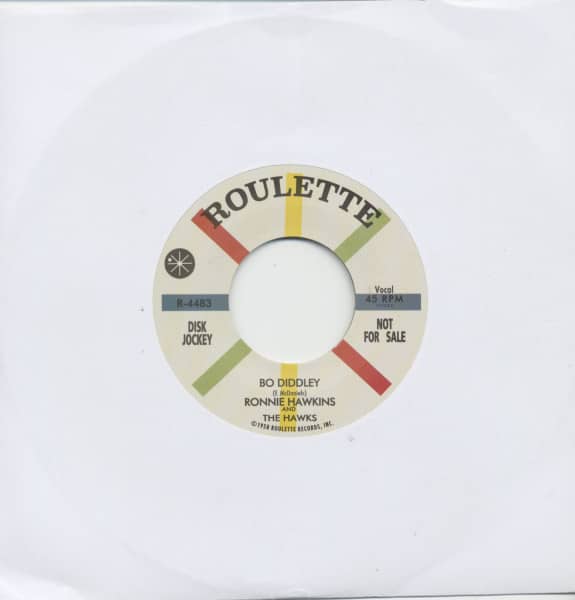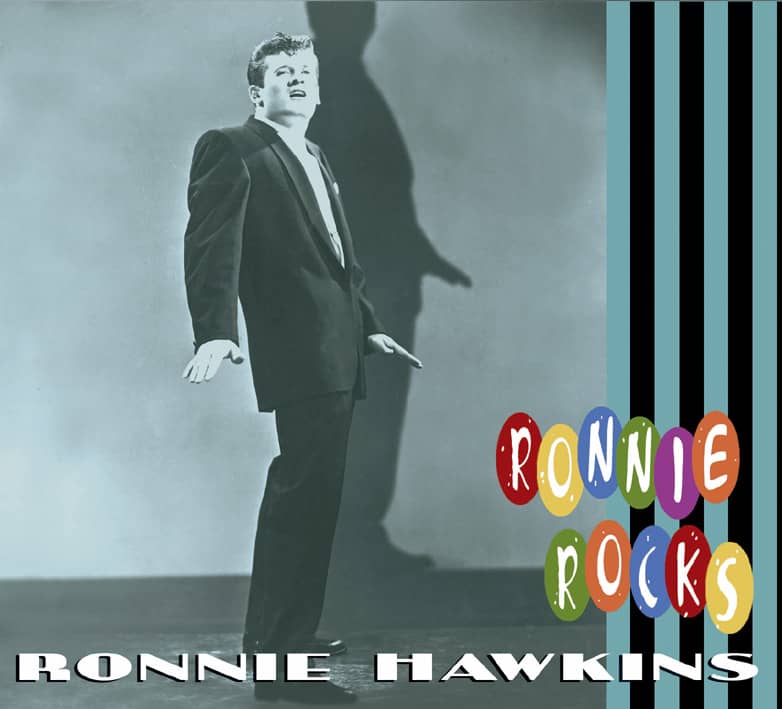Who was/is Ronnie Hawkins ? - CDs, Vinyl LPs, DVD and more
Ronnie Hawkins
RONNIE HAWKINS OBITUARY
“Bigger-than-life” doesn’t even begin to describe the volcanic force of nature that was Rompin’ Ronnie Hawkins. A wild-and-woolly character of the first order whose downhome and often ribald quips were almost as memorable as his powerful singing, Hawkins died in Toronto, Ontario at age 87. Although he was a no-holds-barred rocker from Arkansas who came to musical maturity during the late 1950s, The Hawk’s early recordings for Roulette weren’t really rockabilly, Sam ‘The Man’ Taylor pouring his muscular tenor saxophone all over Hawkins’ classic first album. They were rock and roll at its most primal and manic, however.
Born January 10, 1935 in Huntsville, Arkansas, Hawkins was a cousin to another tough-to-define ‘50s rocker, Dale Hawkins. Ronnie grew up in Huntsville and then Fayetteville, Arkansas, finding an early role model, black musician Buddy Hayes, rehearsing in the rear of a barber shop where Ronnie’s dad cut hair for a living. Hawkins fronted his own band in high school, though he was just as interested in running bootleg whisky across state lines and operating a local nightclub. Hawkins regularly jammed with a black band in Lawton, Oklahoma that also included saxist Aaron Corthen, later known as A.C. Reed, prior to hooking up with guitarist Jimmy Ray Paulman, who had spent time in the bands of Conway Twitty and Billy Riley.
Hawkins, Paulman, and pianist Will ‘Pop’ Jones put together a combo along with teenaged drummer Levon Helm, the quartet working up an explosive act that showcased Ronnie’s gymnastic dancing ability (he later introduced a distinctive step known as The Camel Walk). Ronnie and his Hawks played Arkansas juke joints until Canadian booking agent Harold Kudlets began bringing them north of the border. Hawkins found Canada to his liking so much that he eventually made it his permanent home.
After cutting his first session in Toronto in June of 1958 for the Quality label (his debut single was a revival of Hey Bo Diddley), Rompin’ Ronnie signed with Morris Levy’s New York-based Roulette label in the spring of ’59. Caring not a whit for copyrights, Levy put Ronnie’s name down as co-writer of Hawkins’ first Roulette single Forty Days, a high-energy revival of Chuck Berry’s Thirty Days, and kept the other half for himself, thus cutting Berry out of the publishing royalties entirely. Ronnie’s version proved a medium-sized hit, and he was on his way.
A few months later, Hawkins’ remake of Young Jessie’s R&B hit Mary Lou did even better on the pop charts. His blistering debut album for Roulette further established him as the perfect antidote to the squeaky-clean teen idols that were systematically softening rock and roll as the decade came to a close. But that was it for Hawkins as a hitmaker, despite a memorable appearance on Dick Clark’s prime-time ‘Saturday Night Beech-Nut Show’ TV program. ‘Mr. Dynamo,’ Hawkins’ encore LP for Roulette, introduced Fred Carter, Jr. as his new lead guitarist and contained more blazing covers along with a handful of impressive original rockers.
Hawkins’ frequent longterm gigs in Canada eventually convinced everyone in The Hawks except for Helm to quit and return home. As they split, Ronnie hired Canadians to take their place: guitarist Robbie Robertson, bassist Rick Danko, pianist Richard Manuel, and keyboardist Garth Hudson. Most of them were on Hawkins’ mind-boggling ’63 coupling of Bo Diddley and Who Do You Love, waxed in New York for Roulette under Henry Glover’s supervision. But later that year, The Hawks left Ronnie’s employ to do their own thing, eventually joining Bob Dylan and then emerging as The Band, one of the most memorable rock bands of their era.
Hawkins took their defection in stride, hiring another set of Canadian musicians and settling into his adopted environs, remaining a top draw in Toronto. Roulette hadn’t really known what to do with him, releasing an album’s worth of folk standards and another of Hank Williams classics; after 1963 he didn’t make any more recordings for Levy. He finally resurfaced on vinyl with an eponymous Muscle Shoals-cut 1970 album for Cotillion that held his last chart single, a grinding revival of The Clovers’ Down In The Alley decorated with Duane Allman’s slide guitar. A second Cotillion set, ‘The Hawk,’ emerged the following year. Monument Records issued his next pair of LPs, ‘Rock and Roll Resurrection’ (1972) and ‘The Giant of Rock ‘N’ Roll’ (1974).
When The Band called it a day in 1976 with a gala farewell concert at the Winterland Ballroom in San Francisco, they paid tribute to the man who put them together by inviting Hawkins to be one of the many stars to perform (in his case, a rousing reprise of Who Do You Love). The concert was filmed by Martin Scorsese and subsequently released to theaters as the acclaimed ‘The Last Waltz.’ Hawkins was diagnosed with stomach cancer in 2002 but miraculously beat the disease. The 2004 documentary ‘Ronnie Hawkins: Still Alive and Kickin’’ provided cinematic insight into the charismatic rocker’s intentionally rowdy ride through life.
--Bill Dahl
Ronnie Hawkins
Ronnie Hawkins should have died in 2002 when the doctors agreed that the cancer growing in his stomach was inoperable. With heavy hearts, his many showbiz friends solemnly gathered to say their final farewells to this larger than life character. Time was running out and perhaps only days remained, until a Nashville faith healer materialised and through powers beyond anybody's comprehension, dissolved the evil in his stomach and the Hawk, like a super-hero, emerged unscathed to rock 'n' roll again.
While convalescing at his home near Toronto, Canada, well-wishers were reassured that he was fully recovered and in fine shape but that one more hospital visit was still pending. With a twinkle in his eye he explained. "They want me back for penile reduction surgery". That is Ronnie. The king of the one line gags and a man who can say just about anything without giving offence. Perhaps he should have been a comedian, but instead he has lived his life as a rock 'n' roller.
The Ronnie Hawkins story began on 10th January 1935 when Ronald Cornett Hawkins was born in Huntsville, Arkansas, the third and final child of Jasper and Flora Hawkins. It was a good week for babies in the south. Four hundred miles to the east, in Tupelo, Mississippi, Gladys Presley was suffering mixed emotions following the arrival of her twins two days earlier. One had been still born, but happily the other, whom she would call Elvis, was very much alive and already screaming his head off as if anxious to demonstrate his full vocal range.
Years later Ronnie provided a vivid description of his parents when he stated, "My dad was a champion redneck, liked to drink, chase women, fight and do all those things that rednecks like. My mother was a complete opposite. She was a religious fanatic who never missed church in 40 years and used to give 10 per cent of all she earned to the church, which really pissed my dad off".
When Ronnie was nine, the family left Huntsville and moved to Fayetteville. His father took a job cutting hair at the University of Arkansas barber shop and it was there that his son made the acquaintance of the shoe shine boy, a black musician called Buddy Hayes, who used to rehearse his band at the back of the shop. He had a profound effect on the impressionable youngster and Ronnie would spend long periods watching Buddy performing for nickels and dimes out in the square at Fayetteville. In time he gained enough confidence to visit the black area of town, known as the Hollow, where he would sneak into the musicians' hangouts at Sherman's Tavern or Irene's Café, or listen to the gospel singing down at the black church.
Ronnie started his own band while still at high school and spent one summer down in Memphis, sleeping in his car and hanging out with the local musicians. He was on a fact finding trip. "I knew a couple of cats down there and had some addresses. I wanted to get some of those old black records to learn and bring back".
 His mother, a school teacher, may have succeeded in keeping him in school but everyone could sense that he was rapidly spinning out of control. Because of the poor public transport system in rural Arkansas, he had been permitted a driving licence at the age of 12 and this, in time, led him into a bootleg whisky operation. "I used to run whisky from Missouri to Oklahoma, which was a dry state. I was making $300 to $400 a week. It was no great risk because nobody would suspect a teenage kid of having a trunk full of whisky".
His mother, a school teacher, may have succeeded in keeping him in school but everyone could sense that he was rapidly spinning out of control. Because of the poor public transport system in rural Arkansas, he had been permitted a driving licence at the age of 12 and this, in time, led him into a bootleg whisky operation. "I used to run whisky from Missouri to Oklahoma, which was a dry state. I was making $300 to $400 a week. It was no great risk because nobody would suspect a teenage kid of having a trunk full of whisky".
In August 1953 Hawkins was enlisted into the artillery division of the United States National Guard, which only meant weekend soldiering. It left him plenty of time both to play music and also to expand his business activities. The cash from his whisky operation was being invested in Arkansas nightclubs, where a friend, Dayton Stratton, had to front for him as he was still too young for his own liquor licence. He was also now enrolled at the University of Arkansas on a course in science and physical education with vague thoughts about training as a physiotherapist, but studying was never very high on the daily agenda.
He bailed out of University in December 1956, but despite having served in the National Guard, was still eligible for a period of military service. If there was no outbreak of war, he could clear his obligations to Uncle Sam with a six month stint and after basic training at Fort Chaffee, Arkansas was stationed at Fort Sill, Oklahoma for the remainder of his service and it was here that he became a serious rock 'n' roller.
In the racially sensitive fifties a white boy fronting a black rock 'n' roll band in the south seems an unlikely scenario, but at that time there was a popular nightclub called the Amvets Club at Lawton, Oklahoma where the soldiers from Fort Sill would go on their weekend passes. They had a hot little band who played a mixture of rock 'n' roll and blues and Ronnie would sing a couple of songs with them every time he visited the club. Eventually he was hired to front the band on a regular basis at $20 a night whenever his army commitments would allow. One of the Black Hawks, as they became known, was saxophone player A C Reed, half brother of blues legend, Jimmy Reed.
The period with the Black Hawks only lasted as long as Hawkins was serving his time in the military and his career did not properly get started until he returned to Arkansas and hitched up with guitarist Jimmy Ray Paulman, known by the nickname 'Luke'. Brought up in Marianna, Arkansas, Paulman was an exceptional musician who had already toured and recorded with Conway Twitty and more recently had played rockabilly guitar as one of Billy Riley's Little Green Men. When Riley had played at the University of Arkansas, Hawkins had done some guest vocals with the band and sufficiently impressed Paulman that he called and invited him to join a new outfit he was putting together.
They met up in Helena, Arkansas where Ronnie was introduced to Paulman's cousin, Willard 'Pop' Jones, a frantic if somewhat unrefined pianist and the three men were soon rehearsing, while at the same time looking out for a drummer. They found one just outside Helena in the small town of Marvell, Arkansas. Levon Helm was a 15 year old schoolboy who did not even own a set of drums but would go on to become one of the finest rock 'n' roll drummers of them all.
During this period Ronnie was lodging at the Rainbow Motel in Helena which was owned by a local businessman, Charlie Halbert. He paid his way by doing odd jobs for Halbert and at one point was found work painting the ferry boat, 'Memphis Queen'. Fortunately Charlie was a generous man who loved musicians and had once booked Elvis Presley a gig at the Catholic Club at a time when he barely had the money to get home. It was Charlie Halbert who funded the purchase of Levon's drum kit and who constantly encouraged Ronnie and the Hawks as they slowly worked out their act, through long hours of practice in the basement of Radio KFFA, Helena.
Ronnie Hawkins Ronnie Hawkins - Ronnie Rocks
Read more at: https://www.bear-family.com/hawkins-ronnie-ronnie-hawkins-ronnie-rocks.html
Copyright © Bear Family Records
Copyright © Bear Family Records®. Copying, also of extracts, or any other form of reproduction, including the adaptation into electronic data bases and copying onto any data mediums, in English or in any other language is permissible only and exclusively with the written consent of Bear Family Records® GmbH.

Ready to ship today, delivery time** appr. 1-3 workdays

Ready to ship today, delivery time** appr. 1-3 workdays

Ready to ship today, delivery time** appr. 1-3 workdays

Item has to be restocked

This article is deleted and can no longer be ordered!

This article is deleted and can no longer be ordered!

This article is deleted and can no longer be ordered!

This article is deleted and can no longer be ordered!

the very last 1 available
Ready to ship today, delivery time** appr. 1-3 workdays

This article is deleted and can no longer be ordered!

Item has to be restocked

This article is deleted and can no longer be ordered!

This article is deleted and can no longer be ordered!

This article is deleted and can no longer be ordered!

the very last 2 available
Ready to ship today, delivery time** appr. 1-3 workdays

Ready to ship today, delivery time** appr. 1-3 workdays

